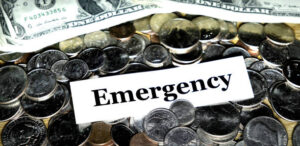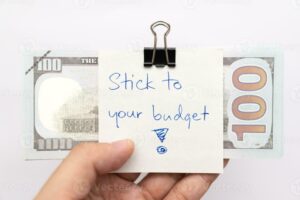Paying off debt is a huge milestone. It means you’ve freed yourself from the burden of owing money and can finally breathe easier. But here’s the catch: many people who clear their debts find themselves back in the same spot within months or even weeks. According to a 2020 report by the Federal Reserve, nearly 40% of Americans wouldn’t be able to cover a $400 emergency expense without borrowing or selling something. This shows how fragile financial freedom can be without the right habits in place.
So, after you’ve paid off your debt, how do you make sure you don’t fall back into it? What habits, strategies, and mindsets will keep your finances healthy and your credit score strong? Let’s dive deep into eight proven ways to stay out of debt once you’ve cleared it, backed by research, expert advice, and practical tips.

—
1. Build and Maintain a Strong Emergency Fund
Why an Emergency Fund Matters

Unexpected expenses are the number one reason people fall back into debt. Whether it’s a sudden car repair, a medical bill, or a job loss, these surprises can quickly derail your finances. The Federal Reserve’s 2023 Economic Well-Being report found that 25% of adults didn’t have enough savings to cover a $400 emergency expense. Without a safety net, many turn to credit cards or loans, which can lead back to debt.
How Much Should You Save?
Experts from the Consumer Financial Protection Bureau (CFPB) recommend saving at least three to six months’ worth of essential living expenses. This means money for rent or mortgage, utilities, groceries, transportation, and insurance — the bare minimum to keep your life stable during tough times.
Steps to Build Your Emergency Fund
- Start Small: If saving six months of expenses seems overwhelming, begin with a goal of $500 or $1,000. This can cover minor emergencies and build your confidence.
- Automate Savings: Set up automatic transfers from your checking account to a high-yield savings account. Treat this like a monthly bill you can’t skip.
- Keep It Separate: Store your emergency fund in a separate account that’s easy to access but not linked to your debit card. This reduces temptation.
- Replenish When Used: If you dip into your emergency fund, prioritize refilling it as soon as possible.
Expert Insight:
Financial planner Jean Chatzky says, “An emergency fund is your first line of defense against debt. It’s the financial shock absorber that keeps you from falling into the debt trap.”
Tools and Resources
- High-Yield Savings Accounts: Look for accounts offering competitive interest rates with no fees.
- Budgeting Apps: Apps like YNAB (You Need A Budget) or EveryDollar can help track your savings progress.
—
2. Create and Stick to a Realistic Budget

The Power of Budgeting
Budgeting isn’t about restricting yourself; it’s about knowing where your money goes. The Bureau of Labor Statistics (BLS) reports that the average American household spends over $63,000 annually. Without a budget, it’s easy to lose track and overspend.
How to Build a Budget That Works
- Track Your Income: Know exactly how much money you bring in after taxes and deductions.
- List Fixed Expenses: These are bills that stay the same each month, like rent, utilities, and insurance.
- Identify Variable Expenses: Things like groceries, gas, and entertainment can fluctuate.
- Set Spending Limits: Allocate a specific amount for each category based on your goals.
- Include Savings: Treat savings as a non-negotiable expense.
- Review and Adjust Monthly: Life changes, and so should your budget.
Common Budgeting Mistakes to Avoid
- Being Overly Strict: Allow yourself some fun money to avoid burnout.
- Ignoring Small Purchases: Small daily expenses add up; track them carefully.
- Not Planning for Irregular Expenses: Include things like annual insurance premiums or holiday gifts.
Dave Ramsey, a well-known personal finance expert, says, “A budget is telling your money where to go instead of wondering where it went.”
Recommended Tools
- Mint: Free app to track spending and create budgets.
- Personal Capital: Great for budgeting and investment tracking.
—
3. Prioritize High-Interest Debt if New Debt Arises
Understanding Debt Types
Not all debt is equally harmful. High-interest debt, especially from credit cards or payday loans, can grow quickly and become unmanageable. According to the National Foundation for Credit Counseling, the average credit card interest rate in 2024 is around 18%, which means carrying a balance can cost you a lot.
Strategies to Manage Debt
- Pay Off High-Interest Debt First: Use the “avalanche” method by targeting debts with the highest interest rates.
- Avoid Minimum Payments: Paying only the minimum extends debt life and increases interest paid.
- Consider Balance Transfers: Some credit cards offer 0% interest for an introductory period. Use this to pay down debt faster.
- Negotiate Lower Rates: Call your creditors to ask for a lower interest rate or better payment terms.
Preventing New Debt
- Use Credit Cards Wisely: Pay off balances in full each month.
- Avoid Impulse Purchases: Wait 24 hours before buying non-essential items.
- Keep Credit Utilization Low: Aim to use less than 30% of your available credit.
Expert Advice
Suze Orman, a respected financial advisor, advises, “The cost of debt is the biggest financial drain. Eliminating high-interest debt is the fastest way to regain control.”
—
4. Live Below Your Means

What Does Living Below Your Means Really Mean?
It means spending less than you earn and avoiding lifestyle inflation. A 2022 survey by Bankrate found that 52% of Americans increased their spending as their income rose, which often leads to debt.
Practical Ways to Live Below Your Means
- Track Your Spending: Awareness is the first step.
- Cut Unnecessary Expenses: Cancel unused subscriptions, cook at home, and shop smart.
- Buy Quality Over Quantity: Invest in durable goods rather than cheap, disposable items.
- Delay Gratification: Wait before making big purchases.
- Set Clear Financial Goals: When you know what you’re saving for, it’s easier to resist splurging.
The Psychology Behind Spending
Research from the University of Michigan shows that people who practice delayed gratification tend to have better financial outcomes. This means resisting short-term pleasures for long-term benefits.
Warren Buffett famously said, “Do not save what is left after spending; instead, spend what is left after saving.”
—
5. Increase Your Income Streams
Why Multiple Income Streams Matter
Relying on a single paycheck is risky. Economic shifts, job loss, or unexpected expenses can threaten your financial health. The U.S. Bureau of Labor Statistics reports that nearly 10% of workers have multiple jobs or side gigs.
Ways to Boost Your Income
- Freelance or Consulting: Use your skills to earn extra money.
- Part-Time Jobs: Consider evening or weekend work.
- Online Businesses: Sell products or services on platforms like Etsy or eBay.
- Investing: Generate passive income through dividends or rental properties.
- Monetize Hobbies: Turn interests into income streams.
Managing Additional Income Wisely
- Dedicate Extra Earnings to Savings or Debt Repayment: Avoid lifestyle inflation.
- Keep Track of Taxes: Additional income may increase your tax burden.
- Balance Work and Life: Avoid burnout by managing your time effectively.
Expert Insight:
Robert Kiyosaki, author of “Rich Dad Poor Dad,” emphasizes, “The rich don’t work for money; they make money work for them.”
—
6. Educate Yourself Continuously About Personal Finance

The Importance of Financial Literacy
Understanding money management is key to avoiding debt. The National Financial Educators Council reports that financial literacy reduces the likelihood of debt and increases savings.
How to Stay Informed
- Read Books: Titles like “The Total Money Makeover” by Dave Ramsey or “Your Money or Your Life” by Vicki Robin.
- Follow Reputable Blogs: Websites like NerdWallet, The Balance, Investopedia and The Financial Savvy blog offer up-to-date advice.
- Take Online Courses: Platforms like Coursera and Udemy offer free and paid courses.
- -Listen to Podcasts: Shows like “The Dave Ramsey Show” or “The Stacking Benjamins Show” provide practical tips.
- Attend Workshops: Community centers and libraries often host free financial literacy sessions.
Avoiding Misinformation
Always verify sources and avoid get-rich-quick schemes. Stick to advice from certified financial planners or trusted institutions.
Financial educator Dave Ramsey says, “Financial peace isn’t the acquisition of stuff. It’s learning to live on less than you make.”
—
7. Use Debt Consolidation and Negotiation Wisely
What is Debt Consolidation?
Debt consolidation involves combining multiple debts into one loan with a lower interest rate. This simplifies payments and can reduce interest costs.
When to Consider Debt Consolidation
- Multiple High-Interest Debts: If you have several credit cards or loans.
- Difficulty Managing Payments: When payments are confusing or overwhelming.
- Good Credit Score: To qualify for better loan terms.
How to Use Debt Negotiation
- Contact Creditors: Explain your situation and request lower interest rates or payment plans.
- Use Professional Help: Credit counseling agencies can negotiate on your behalf.
- Understand the Impact: Debt negotiation may affect your credit score.
Risks to Watch For
- Fees: Some consolidation loans have upfront fees.
- Longer Terms: Lower monthly payments might extend debt duration.
- Avoid New Debt: Don’t accumulate more debt while paying off consolidated loans.
Expert Advice:
The National Foundation for Credit Counseling recommends debt consolidation only if it lowers your overall costs and fits your budget.
—
8. Monitor and Adjust Your Financial Plan Regularly

Why Regular Reviews Matter
Life changes: income, expenses, family size, and goals evolve. A financial plan isn’t set in stone. Regular check-ins help you stay on track and adapt to new circumstances.
How to Review Your Plan
- Set a Schedule: Quarterly or biannual reviews work well.
- Assess Spending and Saving: Compare actual figures to your budget.
- Evaluate Investments: Check performance and rebalance if needed.
- Update Goals: Reflect changes like buying a home or planning for education.
- Seek Professional Advice: A financial planner can provide fresh perspectives.
Benefits of Ongoing Monitoring
- Early Problem Detection: Spot overspending or missed savings early.
- Improved Decision-Making: Make informed choices based on current data.
- Increased Motivation: Seeing progress encourages continued discipline.
Expert Insight:
Financial advisor Suze Orman advises, “Your financial plan is a living document. Treat it like a garden that needs regular tending.”
—
Frequently Asked Questions (FAQs)
Q1. How long does it typically take to build an emergency fund?
A: It depends on your income and expenses. Saving 10-15% of your monthly income can help you reach a 3-6 month emergency fund in about 1-2 years.
Q2. Can I stay out of debt without a budget?
A: While possible, it’s much harder. Budgeting provides clarity and control, reducing the risk of overspending.
Q3. What’s the best way to avoid lifestyle inflation?
A: Focus on your financial goals, automate savings, and remind yourself of the benefits of financial freedom.
Q4. Should I use credit cards after paying off debt?
A: Yes, but responsibly. Use them for planned purchases and pay the full balance monthly to avoid interest.
Q5. How often should I review my financial plan?
A: At least once a year, or whenever major life changes occur.
–
Paying off debt is just the beginning. Staying debt-free requires discipline, planning, and smart financial habits. Building an emergency fund, budgeting realistically, prioritizing high-interest debt, living below your means, increasing income, educating yourself, using consolidation wisely, and regularly reviewing your plan are proven ways to maintain financial health.
—
References and Further Reading
– [Federal Reserve Economic Well-Being of U.S. Households Report 2023](https://www.federalreserve.gov/publications/2023-economic-well-being-of-us-households-in-2023.htm)
– [Consumer Financial Protection Bureau – Emergency Savings](https://www.consumerfinance.gov/about-us/blog/why-emergency-savings-are-important/)
– [National Foundation for Credit Counseling](https://www.nfcc.org/)
– [Bureau of Labor Statistics – Consumer Expenditures](https://www.bls.gov/cex/)
– [Dave Ramsey Official Website](https://www.daveramsey.com/)
– [NerdWallet Personal Finance](https://www.nerdwallet.com/)
– [Investopedia Financial Education](https://www.investopedia.com/financial-education-4689743)










xuj3u9
e6cxa9
0k31wd
4jt7ov